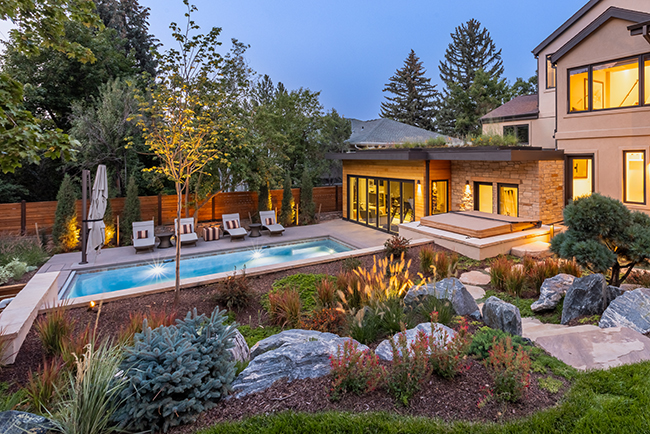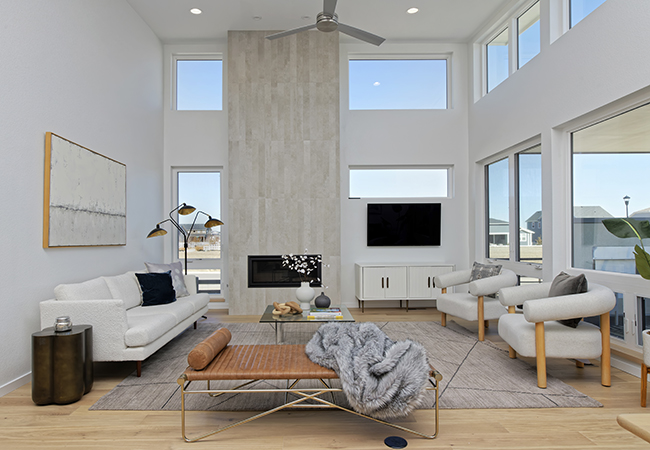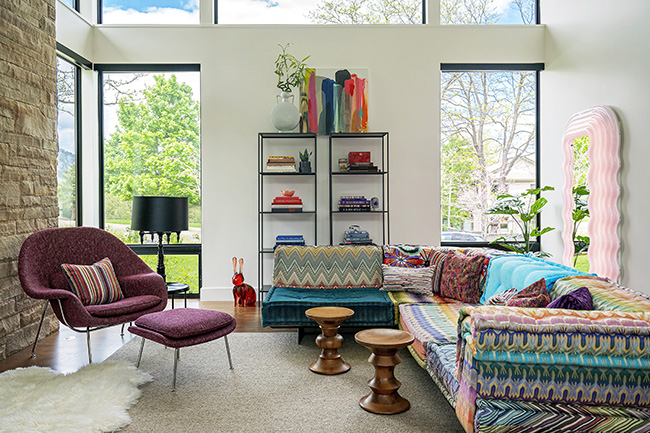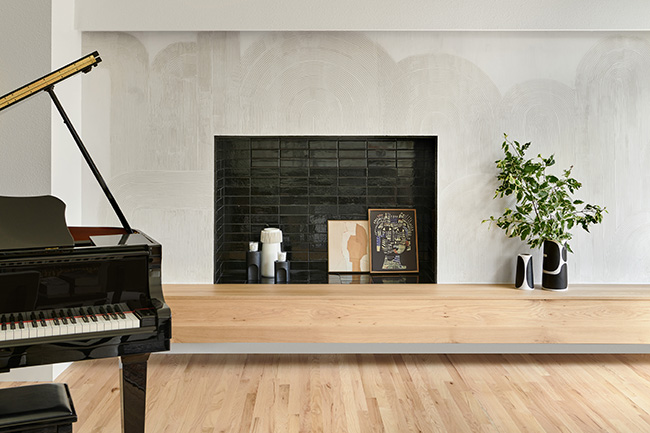Baking Up a Dream Home
24 Mar 2013
For this former bagel-baking magnate, country living is the staff of life.
By Lisa Marshall, photos by Roxanne Capaul
With their fortunes made and their kids grown, many baby boomers have been known to treat themselves to a fancy convertible or a dream vacation. Boulder Bagel Bakery founder Michael Sclafani took a different approach.
 “I wanted this to be a reflection of all my years of hard work,” says Sclafani, 56, of his immaculate 5,700-square-foot bachelor pad he’s sunk more than a million dollars and countless hours into over the past five years. “It was kind of like my reward. It has been an absolute labor of love.”
“I wanted this to be a reflection of all my years of hard work,” says Sclafani, 56, of his immaculate 5,700-square-foot bachelor pad he’s sunk more than a million dollars and countless hours into over the past five years. “It was kind of like my reward. It has been an absolute labor of love.”
Seated on a bucolic 5 acres, complete with a white picket fence, a stream-fed pond, a grain silo, and a 1,300-square-foot guesthouse with river-stone walls, Sclafani’s rural estate northwest of Longmont exudes country summer-camp charm on the outside. But inside is a surprisingly modern, formal space that feels more like a gallery or, perhaps, a work of art itself.
“It has an almost museum-like feel to it,” notes interior designer and longtime friend Roxanne Capaul, who helped Sclafani transform the outdated foreclosure home into a contemporary showpiece.
Built in 1993 by the owner of a concrete company, the main house is framed with thick concrete walls artfully curved to create spacious rooms with dazzlingly high ceilings, stout arches, and a distinct art-deco feel. Giant stucco columns etched with copper accents grace the living room, and curvilinear architectural layers line the kitchen ceiling. There’s barely a right angle in the place.
One look at the crisp white Italian couches and curving cream walls and a visitor might be inclined to wonder—for an instant—if the owner comes from old money.
Hardly, in Sclafani’s case.
“I’m basically a New York street kid,” he says, in a thick accent that reveals his East Coast roots. “I never spent a day in college, and I don’t remember what it was like not to work.”
An only child reared by blue-collar parents, Sclafani got his first job at a bagel bakery in Monticello, N.Y., at age 14. Throughout high school, he spent four nights a week from midnight to 5 a.m. hand-rolling hundreds of bagels before heading off to school that morning. At age 17, he moved to San Francisco and got a job at a bagel shop before coming to Boulder and starting his own in 1978—the renowned Bagel Bakery on Pearl Street.
“I was the guy who brought real New York bagels to Boulder,” Sclafani says proudly, holding up a framed ’70s-era newspaper clipping of himself with shaggy hair and a dough-caked apron. Business boomed throughout the ’80s, with the Bagel Bakery servicing everything from Alfalfa’s Market to the University of Colorado dining halls via the bakery’s wholesale operation.
The restaurant became a Boulder institution, and the straight-talking Italian New Yorker behind the counter began making connections that would shape his future career.
“Every Jewish guy that worked on Wall Street in some capacity ate in my restaurant, because we would open up at 6 a.m. and the financial markets would open up at 7:30 a.m.,” Sclafani says. “I became friends with a lot of those guys.”
When his marriage dissolved, leaving him to raise two kids on his own, life got even more hectic. He’d get up at 4 a.m. to open the restaurant, run back home to get the kids off to school, work all day, then pick them up to take them to games and practices, he recalls.
Sclafani sold the company in 1995 and switched, as he puts it, from “one kind of dough to another,” striking up a new career in Wall Street investing, with the help of many of his former customers. He has since launched his own sports food and beverage company.
[pp_gallery gallery_id="8334" width="180" height="180"]
Nothing Like It
In 2007, with his kids off to college and his new businesses thriving, he set out to find his ideal home. It was love at first sight.
“It was so unique. There was nothing else like it in Boulder County,” he says, noting that he relinquished $20,000 in earnest money on a different property once he set eyes on the concrete sculptured house. “We didn't do much, structurally, to the house. We just had to transform it from what houses looked like 20 years ago, when it was built, to where it needed to be today.”
Walk through and you find a light, open space with a clean aesthetic that blends Sclafani’s discriminating taste with the home’s rural exterior. Over the fireplace in the glorious oval-shaped living room hangs an Asian-fusion piece by Boulder artist David Grojean, one of several throughout the house—all of which have the word “Yes” hidden somewhere on the canvas. Near the entryway is an abstract piece by Barbara Emmett that once hung in the Walnut Cafe.
In the kitchen, a two-story cylindrical skylight casts a morning glow on sleek stainless-steel appliances, a custom oval island, custom cabinetry and a bar for his frequent guests.
Nearly every wall is an almost-white cream color—a nod both to Sclafani’s tendency toward neatness and Capaul’s reverence for the house. “It’s a very formal home, and the cream color does the most justice to it,” she says. (A few red and blue walls were painted over during the remodel). “It just makes it more majestic and elegant.”
Sclafani also transformed a dilapidated outbuilding on the property into a modern 1,300-square-foot guesthouse, with green polished concrete floors (courtesy Aspen Coatings in Denver), cappuccino-colored concrete counter tops, and a custom-commissioned painting of Akita dogs (Sclafani has three) gathering around a campfire.
But his favorite spot, he says, is the pond (refurbished by Bill Elkins of Erie-based Water on the Rocks). It’s bordered by flowing waterfalls and colorful flower terraces, and surrounded by tall trees and historic rock walls (remnants of the property’s days as a working farm), and hosts more than 500 fish of varying species. On the shores are two paddle-boats, where visitors’ children often play in the summer, as Sclafani looks on happily.
“In a way, I’m able to relive a childhood now—one that was stolen from me as a kid,” he says, referring to the long shifts he worked in his youth. “To have come from nothing and now live in this house…I couldn't be more grateful.”












